Answered step by step
Verified Expert Solution
Question
1 Approved Answer
On January 1, 2008, the Branson Company (EIN 22-2222222) and Porto Engineering, Inc. (EIN 33-3333333), formed Branto LLC (an equally owned joint venture). During
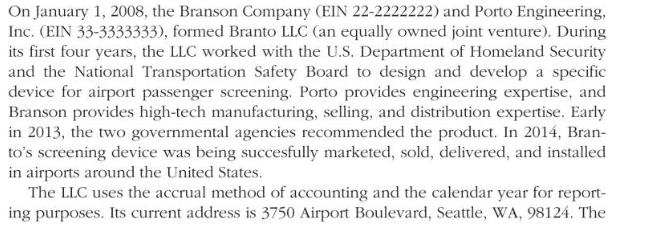
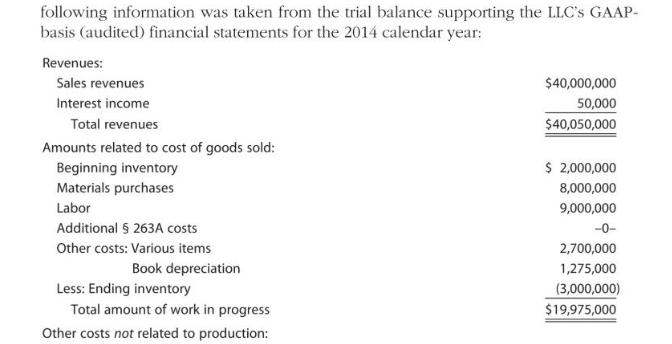
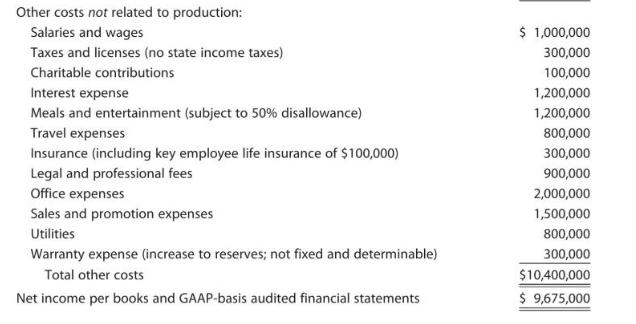
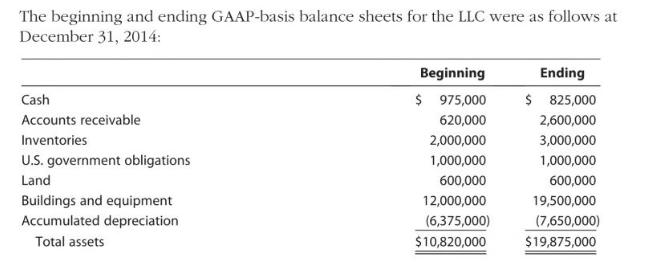


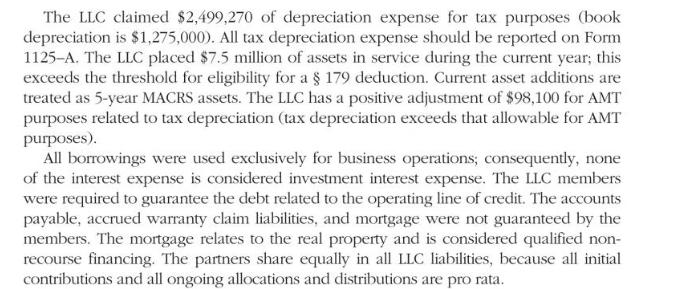
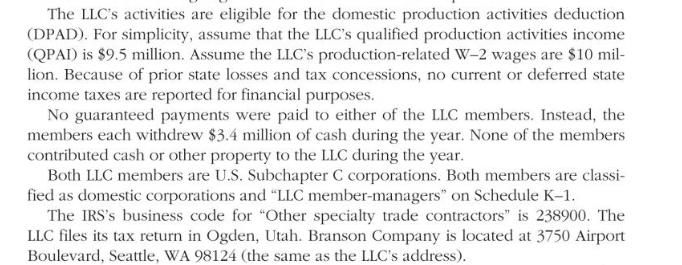


On January 1, 2008, the Branson Company (EIN 22-2222222) and Porto Engineering, Inc. (EIN 33-3333333), formed Branto LLC (an equally owned joint venture). During its first four years, the LLC worked with the U.S. Department of Homeland Security and the National Transportation Safety Board to design and develop a specific device for airport passenger screening. Porto provides engineering expertise, and Branson provides high-tech manufacturing, selling, and distribution expertise. Early in 2013, the two governmental agencies recommended the product. In 2014, Bran- to's screening device was being succesfully marketed, sold, delivered, and installed in airports around the United States. The LLC uses the accrual method of accounting and the calendar year for report- ing purposes. Its current address is 3750 Airport Boulevard, Seattle, WA, 98124. The following information was taken from the trial balance supporting the LLC's GAAP- basis (audited) financial statements for the 2014 calendar year: Revenues: Sales revenues Interest income Total revenues Amounts related to cost of goods sold: Beginning inventory Materials purchases Labor Additional 263A costs Other costs: Various items Book depreciation Less: Ending inventory Total amount of work in progress Other costs not related to production: $40,000,000 50,000 $40,050,000 $ 2,000,000 8,000,000 9,000,000 -0- 2,700,000 1,275,000 (3,000,000) $19,975,000 Other costs not related to production: Salaries and wages Taxes and licenses (no state income taxes) Charitable contributions Interest expense Meals and entertainment (subject to 50% disallowance) Travel expenses Insurance (including key employee life insurance of $100,000) Legal and professional fees Office expenses Sales and promotion expenses Utilities Warranty expense (increase to reserves; not fixed and determinable) Total other costs Net income per books and GAAP-basis audited financial statements $ 1,000,000 300,000 100,000 1,200,000 1,200,000 800,000 300,000 900,000 2,000,000 1,500,000 800,000 300,000 $10,400,000 $ 9,675,000 The beginning and ending GAAP-basis balance sheets for the LLC were as follows at December 31, 2014: Cash Accounts receivable Inventories U.S. government obligations Land Buildings and equipment Accumulated depreciation Total assets Beginning $ 975,000 620,000 2,000,000 1,000,000 600,000 12,000,000 (6,375,000) $10,820,000 Ending $ 825,000 2,600,000 3,000,000 1,000,000 600,000 19,500,000 (7,650,000) $19,875,000 Total assets Accounts payable Operating line of credit (guaranteed by members) Warranty reserves (not guaranteed by members) Mortgage notes on building Capital, Branson Company Capital, Porto Engineering, Inc. Total liabilities and capital $10,820,000 $ 420,000 1,000,000 200,000 5,000,000 2,100,000 2,100,000 $10,820,000 $19,875,000 $ 800,000 5,500,000 500,000 6,000,000 3,537,500 3,537,500 $19,875,000 The LLC uses the lower of cost or market method for valuing inventory. Branto is subject to 263A; for simplicity, assume that 263A costs are reflected in the same manner for book and tax purposes. Branto did not change its inventory accounting method during the year. There were no write-downs of inventory items, and Branto does not use the LIFO method. The LLC claimed $2,499,270 of depreciation expense for tax purposes (book depreciation is $1,275,000). All tax depreciation expense should be reported on Form 1125-A. The LLC placed $7.5 million of assets in service during the current year; this exceeds the threshold for eligibility for a 179 deduction. Current asset additions are treated as 5-year MACRS assets. The LLC has a positive adjustment of $98,100 for AMT purposes related to tax depreciation (tax depreciation exceeds that allowable for AMT purposes). All borrowings were used exclusively for business operations; consequently, none of the interest expense is considered investment interest expense. The LLC members were required to guarantee the debt related to the operating line of credit. The accounts payable, accrued warranty claim liabilities, and mortgage were not guaranteed by the members. The mortgage relates to the real property and is considered qualified non- recourse financing. The partners share equally in all LLC liabilities, because all initial contributions and all ongoing allocations and distributions are pro rata. The LLC's activities are eligible for the domestic production activities deduction (DPAD). For simplicity, assume that the LLC's qualified production activities income (QPAD) is $9.5 million. Assume the LLC's production-related W-2 wages are $10 mil- lion. Because of prior state losses and tax concessions, no current or deferred state income taxes are reported for financial purposes. No guaranteed payments were paid to either of the LLC members. Instead, the members each withdrew $3.4 million of cash during the year. None of the members contributed cash or other property to the LLC during the year. Both LLC members are U.S. Subchapter C corporations. Both members are classi- fied as domestic corporations and "LLC member-managers" on Schedule K-1. The IRS's business code for "Other specialty trade contractors" is 238900. The LLC files its tax return in Ogden, Utah. Branson Company is located at 3750 Airport Boulevard, Seattle, WA 98124 (the same as the LLC's address). The capital account reconciliation on the partners' Schedules K-1 is prepared on a GAAP basis, as are the LLC's Schedules L and M-2. On the Analysis of Income (Loss), the IRS's instructions indicate that the amounts for any LLC members should be reported on the line for limited partners. The LLC is required to file Schedule M-3, Form 8916-A (Supplemental Attachment to Schedule M-3), and Schedule C with its Form 1065. The instructions for Schedule M-3 state that, if a line description is pro- vided on pages 2 or 3 of the form (or on Form 8916), an income or expense item should be reported on the M-3 regardless of whether there is a book-tax difference. a. Prepare pages 1, 4, and 5 of Form 1065 and Form 1125-A for Branto LLC. Do not prepare Form 4562. Leave any items blank where insufficient information has been provided. Prepare supporting schedules as necessary if adequate information is provided. b. Prepare Schedule M-3 and Form 8916-A (page 1 only). Do not prepare Sched- ule C or page 2 of Form 8916-A. There are four book-tax differences (two tem- porary differences and two permanent differences). c. Prepare Schedule K-1 for 50% LLC member Branson Company. On January 1, 2008, the Branson Company (EIN 22-2222222) and Porto Engineering, Inc. (EIN 33-3333333), formed Branto LLC (an equally owned joint venture). During its first four years, the LLC worked with the U.S. Department of Homeland Security and the National Transportation Safety Board to design and develop a specific device for airport passenger screening. Porto provides engineering expertise, and Branson provides high-tech manufacturing, selling, and distribution expertise. Early in 2013, the two governmental agencies recommended the product. In 2014, Bran- to's screening device was being succesfully marketed, sold, delivered, and installed in airports around the United States. The LLC uses the accrual method of accounting and the calendar year for report- ing purposes. Its current address is 3750 Airport Boulevard, Seattle, WA, 98124. The following information was taken from the trial balance supporting the LLC's GAAP- basis (audited) financial statements for the 2014 calendar year: Revenues: Sales revenues Interest income Total revenues Amounts related to cost of goods sold: Beginning inventory Materials purchases Labor Additional 263A costs Other costs: Various items Book depreciation Less: Ending inventory Total amount of work in progress Other costs not related to production: $40,000,000 50,000 $40,050,000 $ 2,000,000 8,000,000 9,000,000 -0- 2,700,000 1,275,000 (3,000,000) $19,975,000 Other costs not related to production: Salaries and wages Taxes and licenses (no state income taxes) Charitable contributions Interest expense Meals and entertainment (subject to 50% disallowance) Travel expenses Insurance (including key employee life insurance of $100,000) Legal and professional fees Office expenses Sales and promotion expenses Utilities Warranty expense (increase to reserves; not fixed and determinable) Total other costs Net income per books and GAAP-basis audited financial statements $ 1,000,000 300,000 100,000 1,200,000 1,200,000 800,000 300,000 900,000 2,000,000 1,500,000 800,000 300,000 $10,400,000 $ 9,675,000 The beginning and ending GAAP-basis balance sheets for the LLC were as follows at December 31, 2014: Cash Accounts receivable Inventories U.S. government obligations Land Buildings and equipment Accumulated depreciation Total assets Beginning $ 975,000 620,000 2,000,000 1,000,000 600,000 12,000,000 (6,375,000) $10,820,000 Ending $ 825,000 2,600,000 3,000,000 1,000,000 600,000 19,500,000 (7,650,000) $19,875,000 Total assets Accounts payable Operating line of credit (guaranteed by members) Warranty reserves (not guaranteed by members) Mortgage notes on building Capital, Branson Company Capital, Porto Engineering, Inc. Total liabilities and capital $10,820,000 $ 420,000 1,000,000 200,000 5,000,000 2,100,000 2,100,000 $10,820,000 $19,875,000 $ 800,000 5,500,000 500,000 6,000,000 3,537,500 3,537,500 $19,875,000 The LLC uses the lower of cost or market method for valuing inventory. Branto is subject to 263A; for simplicity, assume that 263A costs are reflected in the same manner for book and tax purposes. Branto did not change its inventory accounting method during the year. There were no write-downs of inventory items, and Branto does not use the LIFO method. The LLC claimed $2,499,270 of depreciation expense for tax purposes (book depreciation is $1,275,000). All tax depreciation expense should be reported on Form 1125-A. The LLC placed $7.5 million of assets in service during the current year; this exceeds the threshold for eligibility for a 179 deduction. Current asset additions are treated as 5-year MACRS assets. The LLC has a positive adjustment of $98,100 for AMT purposes related to tax depreciation (tax depreciation exceeds that allowable for AMT purposes). All borrowings were used exclusively for business operations; consequently, none of the interest expense is considered investment interest expense. The LLC members were required to guarantee the debt related to the operating line of credit. The accounts payable, accrued warranty claim liabilities, and mortgage were not guaranteed by the members. The mortgage relates to the real property and is considered qualified non- recourse financing. The partners share equally in all LLC liabilities, because all initial contributions and all ongoing allocations and distributions are pro rata. The LLC's activities are eligible for the domestic production activities deduction (DPAD). For simplicity, assume that the LLC's qualified production activities income (QPAD) is $9.5 million. Assume the LLC's production-related W-2 wages are $10 mil- lion. Because of prior state losses and tax concessions, no current or deferred state income taxes are reported for financial purposes. No guaranteed payments were paid to either of the LLC members. Instead, the members each withdrew $3.4 million of cash during the year. None of the members contributed cash or other property to the LLC during the year. Both LLC members are U.S. Subchapter C corporations. Both members are classi- fied as domestic corporations and "LLC member-managers" on Schedule K-1. The IRS's business code for "Other specialty trade contractors" is 238900. The LLC files its tax return in Ogden, Utah. Branson Company is located at 3750 Airport Boulevard, Seattle, WA 98124 (the same as the LLC's address). The capital account reconciliation on the partners' Schedules K-1 is prepared on a GAAP basis, as are the LLC's Schedules L and M-2. On the Analysis of Income (Loss), the IRS's instructions indicate that the amounts for any LLC members should be reported on the line for limited partners. The LLC is required to file Schedule M-3, Form 8916-A (Supplemental Attachment to Schedule M-3), and Schedule C with its Form 1065. The instructions for Schedule M-3 state that, if a line description is pro- vided on pages 2 or 3 of the form (or on Form 8916), an income or expense item should be reported on the M-3 regardless of whether there is a book-tax difference. a. Prepare pages 1, 4, and 5 of Form 1065 and Form 1125-A for Branto LLC. Do not prepare Form 4562. Leave any items blank where insufficient information has been provided. Prepare supporting schedules as necessary if adequate information is provided. b. Prepare Schedule M-3 and Form 8916-A (page 1 only). Do not prepare Sched- ule C or page 2 of Form 8916-A. There are four book-tax differences (two tem- porary differences and two permanent differences). c. Prepare Schedule K-1 for 50% LLC member Branson Company. On January 1, 2008, the Branson Company (EIN 22-2222222) and Porto Engineering, Inc. (EIN 33-3333333), formed Branto LLC (an equally owned joint venture). During its first four years, the LLC worked with the U.S. Department of Homeland Security and the National Transportation Safety Board to design and develop a specific device for airport passenger screening. Porto provides engineering expertise, and Branson provides high-tech manufacturing, selling, and distribution expertise. Early in 2013, the two governmental agencies recommended the product. In 2014, Bran- to's screening device was being succesfully marketed, sold, delivered, and installed in airports around the United States. The LLC uses the accrual method of accounting and the calendar year for report- ing purposes. Its current address is 3750 Airport Boulevard, Seattle, WA, 98124. The following information was taken from the trial balance supporting the LLC's GAAP- basis (audited) financial statements for the 2014 calendar year: Revenues: Sales revenues Interest income Total revenues Amounts related to cost of goods sold: Beginning inventory Materials purchases Labor Additional 263A costs Other costs: Various items Book depreciation Less: Ending inventory Total amount of work in progress Other costs not related to production: $40,000,000 50,000 $40,050,000 $ 2,000,000 8,000,000 9,000,000 -0- 2,700,000 1,275,000 (3,000,000) $19,975,000 Other costs not related to production: Salaries and wages Taxes and licenses (no state income taxes) Charitable contributions Interest expense Meals and entertainment (subject to 50% disallowance) Travel expenses Insurance (including key employee life insurance of $100,000) Legal and professional fees Office expenses Sales and promotion expenses Utilities Warranty expense (increase to reserves; not fixed and determinable) Total other costs Net income per books and GAAP-basis audited financial statements $ 1,000,000 300,000 100,000 1,200,000 1,200,000 800,000 300,000 900,000 2,000,000 1,500,000 800,000 300,000 $10,400,000 $ 9,675,000 The beginning and ending GAAP-basis balance sheets for the LLC were as follows at December 31, 2014: Cash Accounts receivable Inventories U.S. government obligations Land Buildings and equipment Accumulated depreciation Total assets Beginning $ 975,000 620,000 2,000,000 1,000,000 600,000 12,000,000 (6,375,000) $10,820,000 Ending $ 825,000 2,600,000 3,000,000 1,000,000 600,000 19,500,000 (7,650,000) $19,875,000 Total assets Accounts payable Operating line of credit (guaranteed by members) Warranty reserves (not guaranteed by members) Mortgage notes on building Capital, Branson Company Capital, Porto Engineering, Inc. Total liabilities and capital $10,820,000 $ 420,000 1,000,000 200,000 5,000,000 2,100,000 2,100,000 $10,820,000 $19,875,000 $ 800,000 5,500,000 500,000 6,000,000 3,537,500 3,537,500 $19,875,000 The LLC uses the lower of cost or market method for valuing inventory. Branto is subject to 263A; for simplicity, assume that 263A costs are reflected in the same manner for book and tax purposes. Branto did not change its inventory accounting method during the year. There were no write-downs of inventory items, and Branto does not use the LIFO method. The LLC claimed $2,499,270 of depreciation expense for tax purposes (book depreciation is $1,275,000). All tax depreciation expense should be reported on Form 1125-A. The LLC placed $7.5 million of assets in service during the current year; this exceeds the threshold for eligibility for a 179 deduction. Current asset additions are treated as 5-year MACRS assets. The LLC has a positive adjustment of $98,100 for AMT purposes related to tax depreciation (tax depreciation exceeds that allowable for AMT purposes). All borrowings were used exclusively for business operations; consequently, none of the interest expense is considered investment interest expense. The LLC members were required to guarantee the debt related to the operating line of credit. The accounts payable, accrued warranty claim liabilities, and mortgage were not guaranteed by the members. The mortgage relates to the real property and is considered qualified non- recourse financing. The partners share equally in all LLC liabilities, because all initial contributions and all ongoing allocations and distributions are pro rata. The LLC's activities are eligible for the domestic production activities deduction (DPAD). For simplicity, assume that the LLC's qualified production activities income (QPAD) is $9.5 million. Assume the LLC's production-related W-2 wages are $10 mil- lion. Because of prior state losses and tax concessions, no current or deferred state income taxes are reported for financial purposes. No guaranteed payments were paid to either of the LLC members. Instead, the members each withdrew $3.4 million of cash during the year. None of the members contributed cash or other property to the LLC during the year. Both LLC members are U.S. Subchapter C corporations. Both members are classi- fied as domestic corporations and "LLC member-managers" on Schedule K-1. The IRS's business code for "Other specialty trade contractors" is 238900. The LLC files its tax return in Ogden, Utah. Branson Company is located at 3750 Airport Boulevard, Seattle, WA 98124 (the same as the LLC's address). The capital account reconciliation on the partners' Schedules K-1 is prepared on a GAAP basis, as are the LLC's Schedules L and M-2. On the Analysis of Income (Loss), the IRS's instructions indicate that the amounts for any LLC members should be reported on the line for limited partners. The LLC is required to file Schedule M-3, Form 8916-A (Supplemental Attachment to Schedule M-3), and Schedule C with its Form 1065. The instructions for Schedule M-3 state that, if a line description is pro- vided on pages 2 or 3 of the form (or on Form 8916), an income or expense item should be reported on the M-3 regardless of whether there is a book-tax difference. a. Prepare pages 1, 4, and 5 of Form 1065 and Form 1125-A for Branto LLC. Do not prepare Form 4562. Leave any items blank where insufficient information has been provided. Prepare supporting schedules as necessary if adequate information is provided. b. Prepare Schedule M-3 and Form 8916-A (page 1 only). Do not prepare Sched- ule C or page 2 of Form 8916-A. There are four book-tax differences (two tem- porary differences and two permanent differences). c. Prepare Schedule K-1 for 50% LLC member Branson Company. On January 1, 2008, the Branson Company (EIN 22-2222222) and Porto Engineering, Inc. (EIN 33-3333333), formed Branto LLC (an equally owned joint venture). During its first four years, the LLC worked with the U.S. Department of Homeland Security and the National Transportation Safety Board to design and develop a specific device for airport passenger screening. Porto provides engineering expertise, and Branson provides high-tech manufacturing, selling, and distribution expertise. Early in 2013, the two governmental agencies recommended the product. In 2014, Bran- to's screening device was being succesfully marketed, sold, delivered, and installed in airports around the United States. The LLC uses the accrual method of accounting and the calendar year for report- ing purposes. Its current address is 3750 Airport Boulevard, Seattle, WA, 98124. The following information was taken from the trial balance supporting the LLC's GAAP- basis (audited) financial statements for the 2014 calendar year: Revenues: Sales revenues Interest income Total revenues Amounts related to cost of goods sold: Beginning inventory Materials purchases Labor Additional 263A costs Other costs: Various items Book depreciation Less: Ending inventory Total amount of work in progress Other costs not related to production: $40,000,000 50,000 $40,050,000 $ 2,000,000 8,000,000 9,000,000 -0- 2,700,000 1,275,000 (3,000,000) $19,975,000 Other costs not related to production: Salaries and wages Taxes and licenses (no state income taxes) Charitable contributions Interest expense Meals and entertainment (subject to 50% disallowance) Travel expenses Insurance (including key employee life insurance of $100,000) Legal and professional fees Office expenses Sales and promotion expenses Utilities Warranty expense (increase to reserves; not fixed and determinable) Total other costs Net income per books and GAAP-basis audited financial statements $ 1,000,000 300,000 100,000 1,200,000 1,200,000 800,000 300,000 900,000 2,000,000 1,500,000 800,000 300,000 $10,400,000 $ 9,675,000 The beginning and ending GAAP-basis balance sheets for the LLC were as follows at December 31, 2014: Cash Accounts receivable Inventories U.S. government obligations Land Buildings and equipment Accumulated depreciation Total assets Beginning $ 975,000 620,000 2,000,000 1,000,000 600,000 12,000,000 (6,375,000) $10,820,000 Ending $ 825,000 2,600,000 3,000,000 1,000,000 600,000 19,500,000 (7,650,000) $19,875,000 Total assets Accounts payable Operating line of credit (guaranteed by members) Warranty reserves (not guaranteed by members) Mortgage notes on building Capital, Branson Company Capital, Porto Engineering, Inc. Total liabilities and capital $10,820,000 $ 420,000 1,000,000 200,000 5,000,000 2,100,000 2,100,000 $10,820,000 $19,875,000 $ 800,000 5,500,000 500,000 6,000,000 3,537,500 3,537,500 $19,875,000 The LLC uses the lower of cost or market method for valuing inventory. Branto is subject to 263A; for simplicity, assume that 263A costs are reflected in the same manner for book and tax purposes. Branto did not change its inventory accounting method during the year. There were no write-downs of inventory items, and Branto does not use the LIFO method. The LLC claimed $2,499,270 of depreciation expense for tax purposes (book depreciation is $1,275,000). All tax depreciation expense should be reported on Form 1125-A. The LLC placed $7.5 million of assets in service during the current year; this exceeds the threshold for eligibility for a 179 deduction. Current asset additions are treated as 5-year MACRS assets. The LLC has a positive adjustment of $98,100 for AMT purposes related to tax depreciation (tax depreciation exceeds that allowable for AMT purposes). All borrowings were used exclusively for business operations; consequently, none of the interest expense is considered investment interest expense. The LLC members were required to guarantee the debt related to the operating line of credit. The accounts payable, accrued warranty claim liabilities, and mortgage were not guaranteed by the members. The mortgage relates to the real property and is considered qualified non- recourse financing. The partners share equally in all LLC liabilities, because all initial contributions and all ongoing allocations and distributions are pro rata. The LLC's activities are eligible for the domestic production activities deduction (DPAD). For simplicity, assume that the LLC's qualified production activities income (QPAD) is $9.5 million. Assume the LLC's production-related W-2 wages are $10 mil- lion. Because of prior state losses and tax concessions, no current or deferred state income taxes are reported for financial purposes. No guaranteed payments were paid to either of the LLC members. Instead, the members each withdrew $3.4 million of cash during the year. None of the members contributed cash or other property to the LLC during the year. Both LLC members are U.S. Subchapter C corporations. Both members are classi- fied as domestic corporations and "LLC member-managers" on Schedule K-1. The IRS's business code for "Other specialty trade contractors" is 238900. The LLC files its tax return in Ogden, Utah. Branson Company is located at 3750 Airport Boulevard, Seattle, WA 98124 (the same as the LLC's address). The capital account reconciliation on the partners' Schedules K-1 is prepared on a GAAP basis, as are the LLC's Schedules L and M-2. On the Analysis of Income (Loss), the IRS's instructions indicate that the amounts for any LLC members should be reported on the line for limited partners. The LLC is required to file Schedule M-3, Form 8916-A (Supplemental Attachment to Schedule M-3), and Schedule C with its Form 1065. The instructions for Schedule M-3 state that, if a line description is pro- vided on pages 2 or 3 of the form (or on Form 8916), an income or expense item should be reported on the M-3 regardless of whether there is a book-tax difference. a. Prepare pages 1, 4, and 5 of Form 1065 and Form 1125-A for Branto LLC. Do not prepare Form 4562. Leave any items blank where insufficient information has been provided. Prepare supporting schedules as necessary if adequate information is provided. b. Prepare Schedule M-3 and Form 8916-A (page 1 only). Do not prepare Sched- ule C or page 2 of Form 8916-A. There are four book-tax differences (two tem- porary differences and two permanent differences). c. Prepare Schedule K-1 for 50% LLC member Branson Company.
Step by Step Solution
★★★★★
3.54 Rating (164 Votes )
There are 3 Steps involved in it
Step: 1
Booktax differences are reported as follows 1 Depreciation Form 1125A and Schedule M3 P...
Get Instant Access to Expert-Tailored Solutions
See step-by-step solutions with expert insights and AI powered tools for academic success
Step: 2

Step: 3

Ace Your Homework with AI
Get the answers you need in no time with our AI-driven, step-by-step assistance
Get Started


